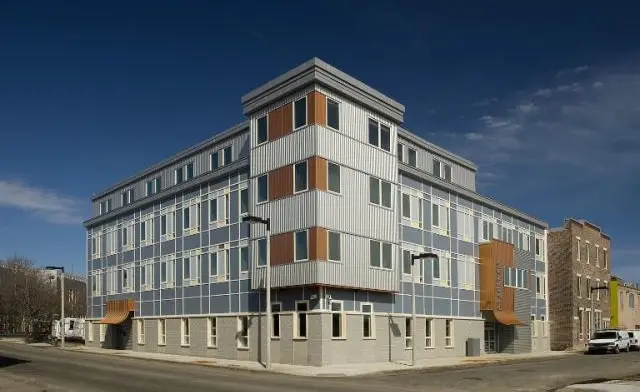

Hope House is located in Boston, Massachusetts. They provide drug and alcohol addiction recovery services to men and women who’re living with a substance use disorder or a mental health struggle. Care is offered through a residential treatment program, an outpatient treatment program, and aftercare support.
Hope House is committed to helping individuals achieve recovery from within, so they can establish lasting sobriety. Through the residential addiction treatment program, you’ll undergo the comprehensive evaluation so that an appropriate care plan is created throughout your program, you’ll have access to mental health, treatment, recovery, education, employment, support, housing, support, and other services throughout treatment.
Their outpatient treatment program offers the same support in a more flexible setting. At the heart of outpatient care is to provide you with education and skills development so that you can build healthy habits for lasting sobriety.
As you enter treatment, the team here will encourage and support you in creating an aftercare plan to follow your treatment. Aftercare will look different for all individuals, and for some, they may qualify for ongoing support through its affiliate housing facility, Zach’s Place.
The Commission on Accreditation of Rehabilitation Facilities (CARF) is a non-profit organization that specifically accredits rehab organizations. Founded in 1966, CARF's, mission is to help service providers like rehab facilities maintain high standards of care.
CARF Accreditation: Yes
The goal of treatment for alcoholism is abstinence. Those with poor social support, poor motivation, or psychiatric disorders tend to relapse within a few years of treatment. For these people, success is measured by longer periods of abstinence, reduced use of alcohol, better health, and improved social functioning. Recovery and Maintenance are usually based on 12 step programs and AA meetings.
Addiction is a highly complex problem, and drug rehab in Massachusetts is often necessary to address it. These programs treat physical, mental, and relational issues that are involved. Treatment empowers individuals to manage these issues without the use of drugs.
Opioid rehabs specialize in supporting those recovering from opioid addiction. They treat those suffering from addiction to illegal opioids like heroin, as well as prescription drugs like oxycodone. These centers typically combine both physical as well as mental and emotional support to help stop addiction. Physical support often includes medical detox and subsequent medical support (including medication), and mental support includes in-depth therapy to address the underlying causes of addiction.
Substance rehabs focus on helping individuals recover from substance abuse, including alcohol and drug addiction (both illegal and prescription drugs). They often include the opportunity to engage in both individual as well as group therapy.
They provide personalized treatment to men and women living with a substance use disorder (SUD). They educate and support their clients, so they can pursue their life’s interests with family, friends and employers, and become self- sufficient members of their communities. They also provide awareness and education on substance use and the disease of addiction to families and the community at large.
The Residential Treatment at Hope Center consists of three phases. At the 21 day Phase I program, clients are evaluated for special needs in the areas of housing, medical condition, job prospects and the like. A client may be referred to community programs and/or practitioners who have affiliation agreements with Hope House as a means to address various special needs. At the same time, the client begins a series of required, intensive daily sessions which include AA group and step meetings, education assemblies focused on such topics as health, Aids, HIV and small group gatherings focused on teaching communication skills, anger management and the role of spirituality in daily living. At the Phase II "Work Program" all clients, if physically able, are expected to be gainfully employed in a full-time job or be engaged in seeking full-time employment on a daily basis. Clients who are unable to work are expected to attend house meetings and to take advantage of volunteer opportunities. As a condition of Phase II, all clients with income must pay a program fee in the form of rent at $119 per week or $17 per day. The Phase III "Aftercare", a client may participate in this phase of the Hope House program after “graduating” from Phase II. This program aspect consists of participation in weekly small groups convened to address daily living issues and the need for peer and/or additional professional support.
Rehab aftercare programs offer customized, wraparound support for clients in the maintenance phase of recovery. Many clients enroll in drug rehab immediately after completing intensive inpatient or residential care. Services encompass outpatient treatment but often extend long beyond the completion of a formal recovery program and typically include a variety of medical, mental health, and social service programs. Peer coaching, relapse prevention, 12 step program induction, and related services are commonly available.
Group therapy is any therapeutic work that happens in a group (not one-on-one). There are a number of different group therapy modalities, including support groups, experiential therapy, psycho-education, and more. Group therapy involves treatment as well as processing interaction between group members.
In individual therapy, a patient meets one-on-one with a trained psychologist or counselor. Therapy is a pivotal part of effective substance abuse treatment, as it often covers root causes of addiction, including challenges faced by the patient in their social, family, and work/school life.
During family therapy, the therapist works with every member of the family unit to understand the role they play in their loved one's addiction. By addressing these patterns, family members learn healthier ways to interact with each other and contribute to a more effective recovery journey for the family member who is addicted.